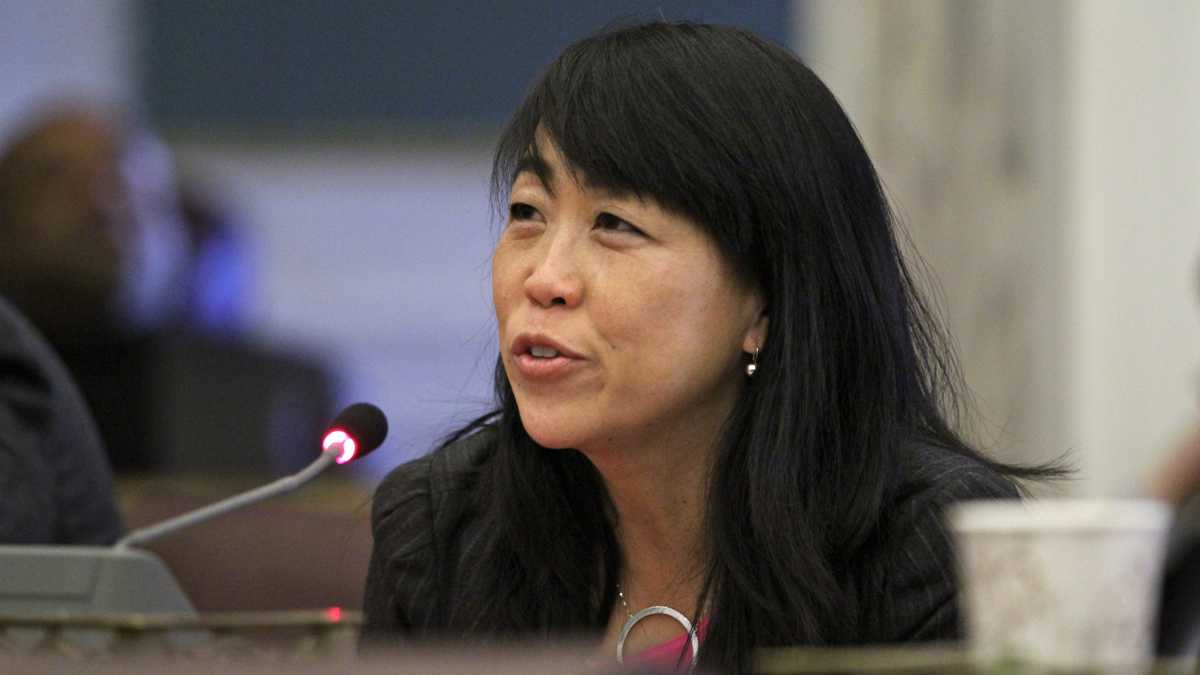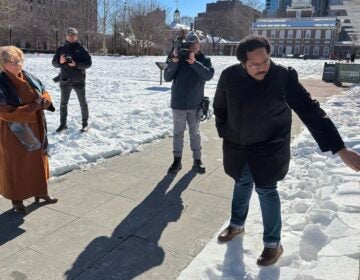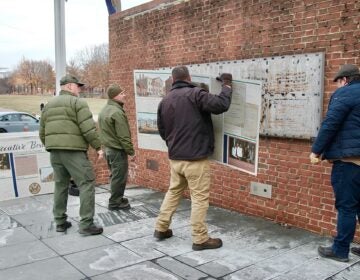Philly Councilwoman Helen Gym unflinching in calls to remove Rizzo statue

City Councilwoman Helen Gym's tweets helped renew the battle over the statue honoring Frank Rizzo. (Emma Lee/NewsWorks)
Philadelphia Councilwoman Helen Gym doesn’t mince words when she describes how she feels about Frank Rizzo.
After the violence in Charlottesville, Virginia, Gym on Monday morning sent these tweets about the statue honoring the late police commissioner and mayor who was known for sometimes brutal treatment of the black and gay communities.
All around the country, we're fighting to remove the monuments to slavery & racism. Philly, we have work to do. Take the Rizzo statue down.
— Helen Gym (@HelenGymAtLarge) August 14, 2017
Let's do this. No Rizzo statue in the heart of our city. https://t.co/EQelxB1zJo
— Helen Gym (@HelenGymAtLarge) August 14, 2017
The tweets helped set off a week of, at times tense, protests in front of the 19-year-old statue. Gym is resolute in her thoughts about the statue — and on Rizzo. I reached out to the first-term councilwoman on Friday, and she said she has no fear or regrets about demanding that the statue installed nearly 20 years ago be moved.
Jay Scott Smith: What led you to send the initial tweets on Monday morning calling for the removal of the Rizzo statue?
Helen Gym: The call for Frank Rizzo’s statue to be removed is not a new one. I’m not the first, and I’m sure I won’t be the last. Frank Rizzo has always been a deeply divisive figure, and his statue and mural have also long been divisive and frequently the targets of a lot of anger. So I think that this is an important time for us. The events in Charlottesville should have us really looking very deeply about our own difficulties with our past, around racism, and just because Philadelphia wasn’t a part of the Confederacy doesn’t mean we shouldn’t have to do anything about that.
JS: How has the response been to the tweet? What are your thoughts on the subsequent protests?
HG: Overwhelmingly, it’s been an outpouring of support and gratitude from many who are eager for us to see a more welcome and inclusive public space. It’s clear that we still wrestle with the legacies of racism today, and that includes a shocking level of violence, misogyny, and hate that’s been exemplified by those who claim to honor Frank Rizzo’s memory.
This isn’t going to stop any conversations. It should make us recognize how important these things are to have. The worst response to hatred and racism is silence and fear. It’s time for our city to send our children and youth a message that we’re strong enough to have this conversation.
JS: Twice this week, the statue was vandalized — including late Thursday night. What are your thoughts on this?
HG: The statue and the mural have long been divisive and frequently the targets of defacement. I believe the mural in South Philadelphia is the most defaced mural in the entire city. It’s clear that the racism that tainted Frank Rizzo’s legacy is not relegated to the past. He doesn’t belong where he is. He belongs in a place that is better suited to his history. He does not belong in the heart of our city as a symbol of city hall.”
JS: For those who might be too young to understand, what is the issue that you and other people of color have with Rizzo?
HG: He is a symbol of a time that we’re trying to get beyond. He ran on a “Vote White” platform. He promised to be the guardian of white rights. He strip-searched black men for the entertainment of the nightly news and raided nightclubs in the LGBTQ community. This is a history that was written down. This was documented by the U.S. Department of Justice that there were frequent lawsuits and consent decrees.
As we enter in to this new era that we’re struggling to understand, we don’t do this by remaining silent or glossing over this history. Because our children know. They’re studying it.
JS: What about those who say that Rizzo had a positive influence on the city? That removing his statue is somehow erasing history.
HG: I recognize that Frank Rizzo means a lot of different things to a lot of different people. But this is not about his personal story. This is about a public space in our city that is a symbol for how we want to welcome the Philadelphia of the future. Frank Rizzo is a part of a history we can’t look away from. People cannot confuse history and memorials. They evolve and change all the time.
Frank Rizzo belongs to history. He’s a larger than life figure who tells a lot about who Philadelphia was. But our public spaces tell a different story about who we aspire to be and what our future holds for us. They have to tell a future we’re trying to build right now.
JS: Have you received any threats because of your stance on this?
HG: (long pause) In the way that people make these statements online, but it’s not a reason to stop the conversation. We can’t remain silent in the face of racism and violence. We have to pull together as a city and show that we are really broadly unified around recognizing the roles of our public spaces, about the inclusivity and vision for Philadelphia we’re trying to build, and that’s what I’m focused on.
JS: Earlier this week, Mayor Jim Kenney said he would be willing to discuss moving the statue once City Council reconvenes in September. What are your thoughts on this?
HG: There are a number of different vehicles that we’re trying to explore that will involve a number of different agencies and commissions within the city of Philadelphia. We look forward to having that become public soon.
WHYY is your source for fact-based, in-depth journalism and information. As a nonprofit organization, we rely on financial support from readers like you. Please give today.




